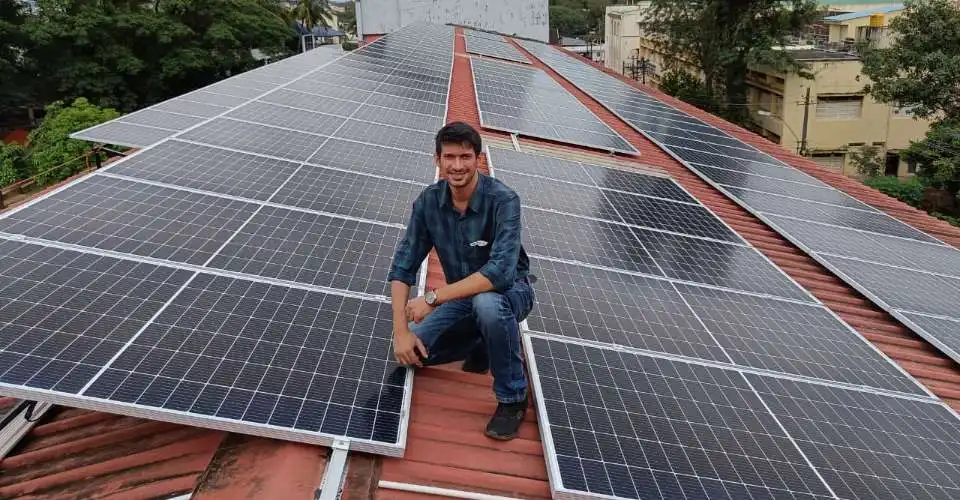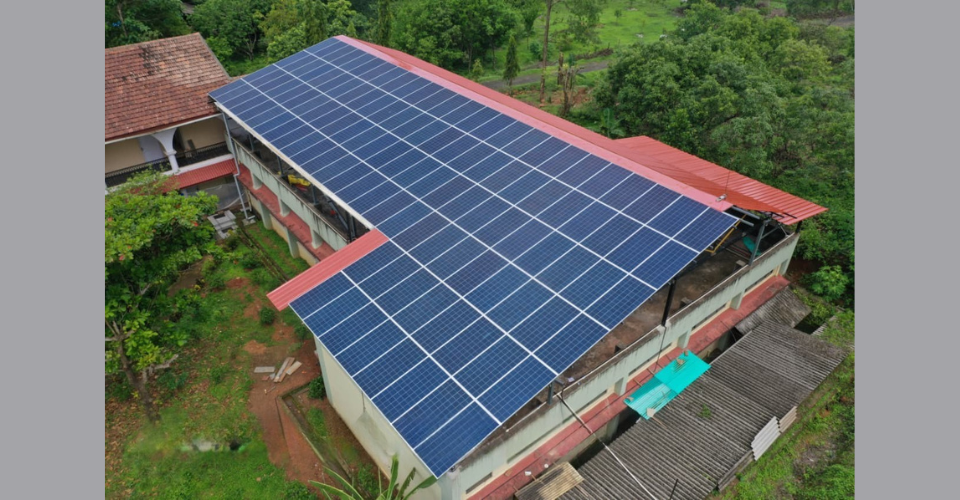Indian Jesuits dump fossil fuels to mitigate climate change impacts

More than half the Jesuits in western India now only use solar power for their institutions — the rest are in the proce
Jesuits in the four provinces of India’s western region are leading a quiet revolution by aiming to become energy self-sufficient using only sunlight, setting an example for others to follow for sustainable, clean energy to protect the environment.
About 60 institutions “have achieved zero electricity bills for quite some time and demonstrated that it is a viable project to save the only home we have — the fragile Earth,” says Father Frazer Mascarenhas, coordinator of the Ecology Platform of Jesuit West Zone Provinces in India.
One of them is Vinayalaya, a Jesuit-run training center, in western Mumbai (formerly Bombay). The center has completely switched to solar power to generate renewable energy.
The Jesuit priest, a former principal of Mumbai’s St Xavier’s College, said the center even uses solar power to charge their electric cars and scooters.
The project aims to install solar panels in all 110 Jesuit residences, schools, and institutions in the four Jesuit provinces of the Western Zone — Bombay (Mumbai), Goa, Gujarat, and Pune — that together have 1,340 Jesuit priests and brothers.
More than half the residences already use solar power, while others are in the process, Mascarenhas told UCA News on Sept.15.
Vinayalaya, with two large sets of solar panels of 40 kW and 20 kW each, is now producing surplus power, which is transferred to the state’s common power grid,” Mascarenhas noted.
It is one way to show that individuals and families can take action to lessen the effects of climate change, cut down on carbon emissions, and care for our common home for future generations, the Jesuit said.

An aerial view of solar panels installed atop a facility run by the Jesuits of Goa Province in India. (Photo supplied)
“Leading by example’
Mascarenhas said the four Jesuit administrative provinces launched the green project in June 2024 and decided to become entirely solar-powered in all their schools, colleges, residences, and other institutions within three years.
The decision was taken during a meeting when Jesuit leaders resolved to lead by example rather than just speaking about the need to change lifestyles to help save the environment, the priest said.
Within one and a half years, all four provinces together have achieved 60 percent of the target, and the remaining 40 percent will follow before June 2027,” said Mascarenhas, who coordinates the initiative.
The Jesuits’ Goa province led the way and achieved almost a 90 percent conversion to solar energy in April this year, Mascarenhas noted.
“Pune, Mumbai and Gujarat are making strides. The Bombay Province, with its vast network of large institutions, is generating more solar energy than all the other three provinces put together,” he said.
“More than 50 percent of the big Jesuit houses and large educational and training institutions pay zero bills for the power they utilize,” he explained.
“The Jesuits have demonstrated successfully that a transition to renewable and non-polluting energy is possible, and could mitigate the disastrous effects of climate change and promote sustainable development,” he added.
Goa’s lead role
Father Nigel Alphonso, who coordinates Goa Province’s efforts, said most of their schools, institutions, and residences generate their own green energy through solar power, promoting ecological sustainability.”
The Jesuits have a combined capacity to generate 415 kW across the state of Goa and Belgaum district in neighboring Karnataka state, he said.
“These systems are estimated to reduce carbon emissions by 500 to 600 tonnes and save about 26,000- 28,000 trees annually, making a significant contribution to environmental protection and climate action,” he pointed out.
The project, besides saving money on electricity bills, generates clean and renewable energy, “is a powerful testament to our commitment to environmental stewardship,” Alphonso noted.
The project helps “inspire students, staff, and collaborators across our institutions” on the need for clean energy and stands as living proof that avoiding fossil fuels is possible,” he said.
Jesuits have also extended guidance and support to other religious and educational organizations adopting solar energy, Alphonso said.

“This collaborative effort has sparked a growing green movement, with many institutions across Goa state and the Belgaum region following suit and installing solar panels to power their campuses sustainably,” he noted.
Alphonso said two Jesuit schools installed solar panels in 2019, generating enough electricity to power the entire school’s operations, and transferred surplus power to the state grid.
“It showcased the potential of solar power not only as an environmentally responsible choice but also as an economically viable one. I led this initiative with my own research, design, and installed the majority of the solar power plants in the province,” Alphonso explained.
His study helped him identify high-performance inverters and solar panels designed to last more than 30 years, ensuring both reliability and cost-effectiveness.
“The implementation was carried out with the help of in-house manpower, with the support of trained electricians. It significantly reduced costs and also built local capacity,” he said.
“Beyond solar power”
Jesuit Father Anthony Suresh of Gujarat Province said they have also begun installing solar power systems in their homes “to showcase that green energy is possible to reduce the carbon footprint.”
But in Gujarat, where most people depend on farming, Jesuits have been doing “much more than harnessing solar power” to protect Mother Earth, the priest said.
Jesuits have also developed “four model farms in the state and trained more than 100 farmers, including 40 women, on adopting sustainable agriculture practices.
“These model farms have become economically viable and sustainable,” he noted.

They have also trained approximately 2,000 students, 2,000 parish youths, and more than 1,200 adults over the past two years on practical ways to mitigate global warming and promote sustainable development practices.
“As a result, institutions and parishes have initiated and maintained good practices in waste management, plastic-free campuses, and tree planting,” he explained.
The province has also published evidence-based reports of organic farming (inputs) and soil improvement and awareness materials on organic farming, ecology, climate change, and waste management.
“Our aim is to at least make 300 to 400 farmers self-sustainable through sustainable agriculture practices leading to sustainable living,” Suresh said.
‘Act to avoid eco-genocide’
Mascarenhas said they acted, understanding the seriousness of ecological destruction and its inevitable impact on life on Earth.
Mascarenhas said that since the 1970s, UN scientists worldwide have been raising concerns that the Earth’s average temperature is increasing rapidly.
This increase is caused mainly by the use of fossil fuels (coal, oil, and gas), which emit gases that trap heat in the planet’s atmosphere, according to scientists.
The World Meteorological Organization announced earlier this year that the planet had already warmed by 1.55 degrees in 2024, and the trend suggests it could increase by over 3 degrees by 2050.
Climate change, in turn, leads to flash floods, melting glaciers, rising sea levels, changing rainfall patterns, and an increase in tornadoes, hurricanes, storms, and heat waves, he said.
“There will be eco-genocide if this heating of the Earth were to be ignored. Clearly, the world needs to say no to fossil fuels,” Mascarenhas said.
Article Courtesy of


